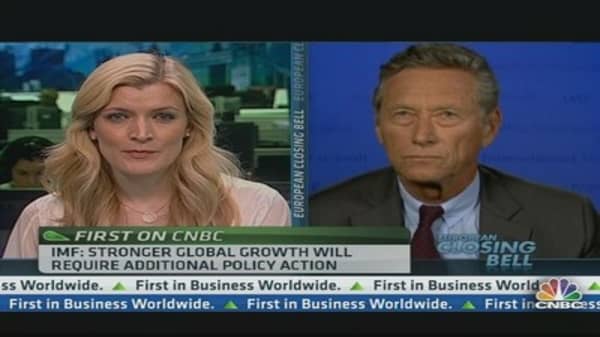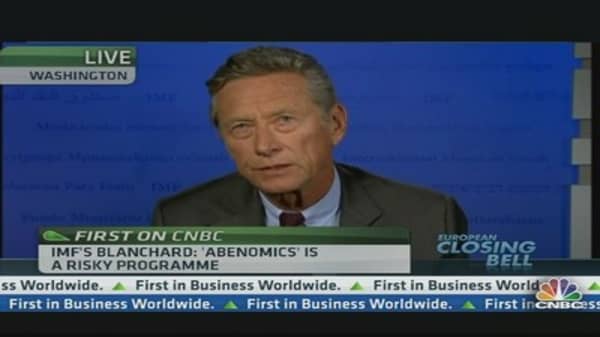The International Monetary Fund (IMF) downgraded its global growth outlook for 2013 on Tuesday, and warned of three "new risks" that threaten to derail the global economic recovery.
In its latest World Economic Outlook report, the IMF downgraded its global growth forecast for this year to 3.1 percent, having predicted 3.3 percent growth in April. It also downgraded its growth outlook for next year to 3.8 percent, from 4.0 percent.
Olivier Blanchard, the organization's director of research, told CNBC that as well as the "overwhelming risk" of a poor economic recovery in Europe, there were three new issues that could threaten the global economy.
"The first one is China. China has a very delicate rebalancing to do between investment and consumption, and the risk is that investment declines before consumption can really recover," Blanchard said on Tuesday, following the release of the report.
"This would lead to lower growth in China, even below the downward revision we have already done." The IMF revised its growth outlook for China down to 7.8 percent in 2013, and 7.7 percent in 2014.
(Read More: Asia 'Shivers' as Fed Tapers, China Slows)
The second key threat was Japan's radical measures to boost its economy, or "Abenomics", Blanchard said.
"Abenomics is a very ambitious program — but it's a very risky one. And it seems to us that at least two of the arrows haven't quite been totally refined yet," Blanchard said. He added that fiscal stimulus without fiscal consolidation was "worrisome."
Blanchard identified the scaling back of the Federal Reserve's asset-purchasing program as the third risk facing the global economy.
"The third risk... is the risk from the exit from quantitative easing in the U.S," he said. "This can lead to a lot of volatility…. We think the volatility will calm down, but one cannot be sure."
Emerging Market Concerns
The IMF also warned about the dangers posed by volatility and slowdown in emerging markets, which it said had been significantly affected by the increased financial market volatility seen in May and June.
(Read More: EM Growth Hits Lowest Since Financial Crisis)
"Emerging market economies have generally been hit hardest, as recent increases in advanced economy interest rates and asset price volatility, combined with weaker domestic activity (see below) have led to some capital outflows, equity price declines, rising local yields, and currency depreciation," the IMF said in its report.
Blanchard added that as the U.S. became more attractive to investors, "we're probably going to see a trend of capital outflows from emerging markets."
Growth in developing economies is now expected to evolve at a more "moderate pace", the IMF said. It revised down its growth outlook for all four BRIC (Brazil, Russia, India and China) nations, as well as for emerging markets as a whole.
"The outlook for many commodity exporters (including those among the BRICS) has also deteriorated due to lower commodity prices," the report added.
Major investment banks such as Goldman Sachs, Deutsche Bank and HSBC have also warned of the slowdown in growth in emerging markets.
(Read More: HSBC Cuts Global Growth Forecasts on China, Fed)
In addition, the Bank of America Merrill Lynch Fund Manager Survey showed that around 9 percent of asset managers were underweight on emerging market equities in June — the first underweight reading since 2009, and down from a 3 percent overweight position in May.
A Mixed Picture
At a news conference held after the report was released, Olivier Blanchard, the IMF director of research, warned that a 2 percent decrease in emerging market growth might decrease U.S. or euro zone growth by around 0.5 percent.
The organization reduced its growth outlook for the U.S. to 1.7 percent in 2013 and 2.7 percent next year, having previously predicted growth of 1.9 percent and 2.9 percent respectively. The number for this year was weaker than the 2 percent growth forecast given by the White House on Monday.
The IMF also downgraded its expectations for the euro zone economy, which it now expects to contract by 0.6 percent this year, before expanding by 0.9 percent in 2014.
The U.K., however, saw its growth outlook upgraded. It is now expected to expand by 0.9 percent in 2013, following a number of positive data releases and business surveys.
(Read More: IMF May Be Forced to Eat Humble Pie Over UK)
Blanchard told CNBC he was "very happy" that the IMF had upgraded the U.K.'s growth outlook, but stressed that the country's economy remained weak.
"The revision still leaves growth at around 1 percent, which is still very weak growth. So everything we said just applies nearly as much. Fiscal flexibility seems to us to still be of the essence in that case," Blanchard said.





